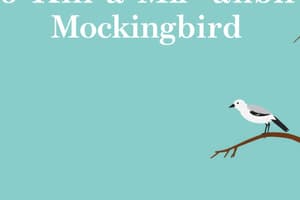Podcast
Questions and Answers
What happens to Mrs. Dubose at the end of her reading sessions with Jem?
What happens to Mrs. Dubose at the end of her reading sessions with Jem?
She passes away and leaves Jem a single white camellia.
Scout looks forward to Dill's arrival in Maycomb for the summer.
Scout looks forward to Dill's arrival in Maycomb for the summer.
True (A)
Why does Aunt Alexandra come to stay with the Finch family?
Why does Aunt Alexandra come to stay with the Finch family?
To provide the children with a feminine influence.
Aunt Alexandra allows Scout to attend church with Calpurnia.
Aunt Alexandra allows Scout to attend church with Calpurnia.
Who does Scout recognize in the mob at Maycomb Jail?
Who does Scout recognize in the mob at Maycomb Jail?
What does Atticus reveal during the trial that raises questions about the evidence against Tom Robinson?
What does Atticus reveal during the trial that raises questions about the evidence against Tom Robinson?
What does Tom claim happened when he entered Mayella Ewell's house?
What does Tom claim happened when he entered Mayella Ewell's house?
Atticus believes that Mayella is a lonely girl who conceals her shame.
Atticus believes that Mayella is a lonely girl who conceals her shame.
Flashcards are hidden until you start studying
Study Notes
Chapter 11
- Mrs. Dubose is characterized as a harsh old woman who insults Scout and Jem.
- As punishment for destroying her garden, Jem is forced to read to Mrs. Dubose, who is battling addiction.
- During the reading sessions, Mrs. Dubose has seizures and ultimately dies, leaving Jem a white camellia as a symbolic gesture of forgiveness.
Chapter 12
- Jem, now 12, distances himself from Scout, prompting her disappointment over Dill's absence for the summer.
- Dill communicates his situation with his new father through a letter.
- Calpurnia takes Scout and Jem to First Purchase Church, warmly welcomed by the black community.
- Scout learns about Tom Robinson's accusation by Bob Ewell and questions the credibility of the Ewell family's word.
Chapter 13
- Aunt Alexandra moves in to instill a feminine influence on the Finch children.
- She receives a warm local welcome, highlighted by neighbors bringing food.
- Alexandra emphasizes the importance of Finch heritage, leading to Scout's emotional distress as Atticus has to address family pride.
Chapter 14
- Scout and Jem face increasing scrutiny from the community due to Tom Robinson's trial.
- When Scout inquires about rape, it leads to tensions with Aunt Alexandra, who prohibits her from attending church.
- Dill runs away from home due to neglect from his new family, prompting Scout to inform Atticus.
Chapter 15
- Tensions rise as Tom Robinson is taken to Maycomb Jail, prompting Scout and Jem to follow Atticus for support.
- A mob confronts Atticus at the jail, demanding he step aside, but he stands firm.
- Scout bravely interacts with Mr. Cunningham, diffusing the mob situation and causing them to disperse.
Chapter 16
- The trial garners national attention, with various onlookers attending the courtroom.
- Scout and Jem sit in the black section to avoid being noticed by Atticus, exemplifying the racial divides of the time.
Chapter 17
- Heck Tate testifies about finding Mayella Ewell injured, with strong implications of abuse by Tom Robinson.
- Atticus highlights the absence of a doctor post-assault and questions Bob Ewell's testimony, revealing him as left-handed, which is significant to the case.
Chapter 18
- Mayella provides her testimony, depicting fear while implicating Tom Robinson.
- Atticus interrogates her story, pointing out inconsistencies about her siblings not hearing her cries.
- Mayella's emotional outburst calls for the jury's conviction, showcasing her desperation.
Chapter 19
- Tom Robinson's testimony contradicts Mayella's claims, revealing he was merely performing tasks for her.
- He recounts an encounter where Mayella attempted to advance on him, leading to Bob's violent interference that made Tom flee.
Chapter 20
- Atticus’s closing arguments focus on the lack of evidence and unreliable witnesses in the trial.
- He argues that Mayella’s loneliness led to her actions and implores the jury not to let racial prejudice influence their judgment.
- Calpurnia enters just as Atticus concludes, signaling a timely interruption in the courtroom setting.
Studying That Suits You
Use AI to generate personalized quizzes and flashcards to suit your learning preferences.




